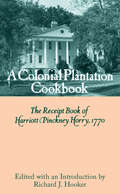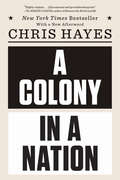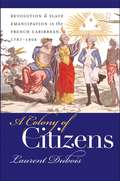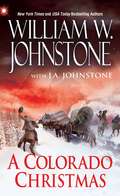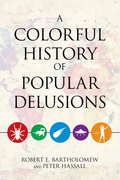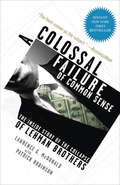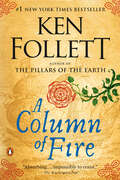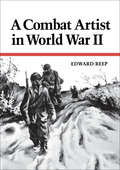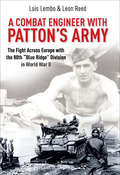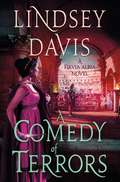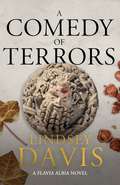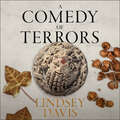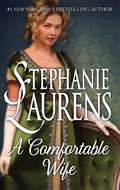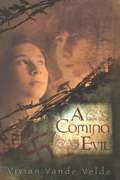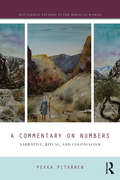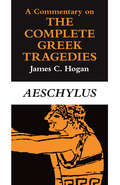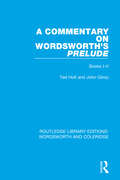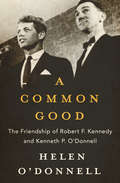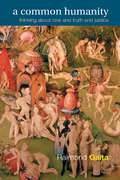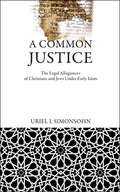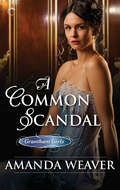- Table View
- List View
A Colonial Plantation Cookbook: The Receipt Book of Harriott Pinckney Horry, 1770
by Richard J. Hooker“A charming compilation of eighteenth-century recipes . . . a well-researched account of Mrs. Horry’s fascinating life-style.” —The North Carolina Historical ReviewHarriott Pinckney Horry began her receipt book more than two hundred years ago. It is being published now for the first time.You will get a lively sense of what colonial plantation life was like from reading Harriott’s receipt book. She began it in 1770, shortly after she was married, writing recipes and household information in a notebook. Her recipes reflect both English and French culinary traditions. You will recognize in the recipes the origins of some of your contemporary favorites.Harriott writes also about keeping the dairy and smokehouse, how to dye clothes, what to do about insects, how to care for trees and crops, and how to make soap, all skills she learned in the course of managing the plantation after her husband’s early death.From Harriott’s writing and Hooker’s knowledgeable introduction and editorial notes, you will learn what it was like to be well-to-do and a member of Southern aristocracy, living in a world of rice and indigo planters, merchants, lawyers, and politicians—the colonial elite. Because knowing about food preferences and eating habits of any people expands our understanding of their nature and times, the receipt book of Harriott Pinckney Horry opens another window on the history of colonial plantations.“Gives us a very good idea of the household’s prize dishes.” —The Washington Post“Cookbook collectors will love it and even readers who don’t enter the kitchen will find it entertaining.” —The Charleston Evening Post
A Colony in a Nation
by Chris Hayes<P>New York Times best-selling author and Emmy Award–winning news anchor Chris Hayes argues that there are really two Americas: a Colony and a Nation. <P>America likes to tell itself that it inhabits a postracial world, yet nearly every empirical measure—wealth, unemployment, incarceration, school segregation—reveals that racial inequality has barely improved since 1968, when Richard Nixon became our first “law and order” president. With the clarity and originality that distinguished his prescient bestseller, Twilight of the Elites, Chris Hayes upends our national conversation on policing and democracy in a book of wide-ranging historical, social, and political analysis. <P>Hayes contends our country has fractured in two: the Colony and the Nation. In the Nation, we venerate the law. In the Colony, we obsess over order, fear trumps civil rights, and aggressive policing resembles occupation. A Colony in a Nation explains how a country founded on justice now looks like something uncomfortably close to a police state. How and why did Americans build a system where conditions in Ferguson and West Baltimore mirror those that sparked the American Revolution? <P>A Colony in a Nation examines the surge in crime that began in the 1960s and peaked in the 1990s, and the unprecedented decline that followed. Drawing on close-hand reporting at flashpoints of racial conflict, as well as deeply personal experiences with policing, Hayes explores cultural touchstones, from the influential “broken windows” theory to the “squeegee men” of late-1980s Manhattan, to show how fear causes us to make dangerous and unfortunate choices, both in our society and at the personal level. With great empathy, he seeks to understand the challenges of policing communities haunted by the omnipresent threat of guns. Most important, he shows that a more democratic and sympathetic justice system already exists—in a place we least suspect. <P>A Colony in a Nation is an essential book—searing and insightful—that will reframe our thinking about law and order in the years to come. <P><b>A New York Times Bestseller</b>
A Colony of Citizens: Revolution & Slave Emancipation in the French Caribbean, 1787-1804
by Laurent Dubois<P>The idea of universal rights is often understood as the product of Europe, but as Laurent Dubois demonstrates, it was profoundly shaped by the struggle over slavery and citizenship in the French Caribbean. Dubois examines this Caribbean revolution by focusing on Guadeloupe, where, in the early 1790s, insurgents on the island fought for equality and freedom and formed alliances with besieged Republicans. <P> In 1794, slavery was abolished throughout the French Empire, ushering in a new colonial order in which all people, regardless of race, were entitled to the same rights. But French administrators on the island combined emancipation with new forms of coercion and racial exclusion, even as newly freed slaves struggled for a fuller freedom. In 1802, the experiment in emancipation was reversed and slavery was brutally reestablished, though rebels in Saint-Domingue avoided the same fate by defeating the French and creating an independent Haiti. The political culture of republicanism, Dubois argues, was transformed through this transcultural and transatlantic struggle for liberty and citizenship. The slaves-turned-citizens of the French Caribbean expanded the political possibilities of the Enlightenment by giving new and radical content to the idea of universal rights.
A Colorado Christmas
by William W. Johnstone J. A. JohnstoneTHE GREATEST WESTERN WRITERS OF THE 21ST CENTURY At the Sugarloaf Ranch, Smoke and Sally Jensen prepare to welcome Preacher home for the holidays--unaware that their friend is trailed by a storm full of trouble. On a mission of vengeance, an old trapper is rescued by Ace and Chance Jensen from ruthless outlaws--and wanted by a driven bounty hunter named Luke Jensen. And, just released from prison, a criminal mastermind assembles a vicious gang of cutthroats to extract his final revenge against his enemy--the sheriff of Big Rock, Colorado . . . With a snowstorm brewing, a community in jeopardy, and a showdown ready to explode, these courageous pioneers are brought together by fate and fury to forge peace on earth. But they're going to have to fight for it. With guns. With grit. With glory. Because this Christmas, the greatest gift of all is . . . staying alive.RAVES FOR BUTCH CASSIDY THE LOST YEARS!"Johnstone is a masterful storyteller, creating a tale that is fanciful and funny, exciting and surprisingly convincing. This is great fun."--Publishers Weekly"An entertaining story with lots of plot twists."--BooklistRAVES FOR JOHNSTONE'S CHRISTMAS EPICS!"An absorbing tale of Christmas with a side of magic . . . An exciting visit to the old west of gunfights and cattle drives. Four stars!"-- RT Book Reviews on A Rocky Mountain Christmas"This is an exciting visit to the old west of gunfights and cattle drives . . . the story draws one in and the modern world fades away. An absorbing tale of Christmas with a side of magic. Four stars!"--RT Book Reviews on A Lone Star Christmas"This rollicking Western is full of gunfights, outlaws, and an unforgettable holiday."--Library Journal on A Texas Hill Country Christmas
A Colorful History of Popular Delusions
by Robert E. Bartholomew Peter HassallThis eclectic history of unusual crowd behavior describes a rich assortment of mass phenomena ranging from the amusing and quirky to the shocking and deplorable. What do fads, crazes, manias, urban legends, moral panics, riots, stampedes, and other mass expressions of emotion have in common? By creating a typology of such behavior, past and present, the authors show how common extraordinary group reactions to fear or excitement are. And they offer insights into how these sometimes dangerous mob responses can be avoided. We may not be surprised to read about the peculiarities of the European Middle Ages, when superstition was commonplace: like the meowing nuns of France, "tarantism" (a dancing mania) in Italy, or the malicious anti-Semitic poison-well scares. But similar phenomena show up in our own era. Examples include the social-networking hysteria of 2012, which resulted in uncontrollable twitching by teenage girls in Leroy, NY; the "phantom bus terrorist" of 2004 in Vancouver, Canada; and the itching outbreak of 2000 in South Africa. Vivid, detailed, and thoroughly researched, this is a fascinating overview of collective human behavior in its many unusual forms.From the Trade Paperback edition.
A Colossal Failure of Common Sense: The Inside Story of the Collapse of Lehman Brothers
by Patrick Robinson Lawrence G. McDonaldOne of the biggest questions of the financial crisis has not been answered until now: What happened at Lehman Brothers and why was it allowed to fail, with aftershocks that rocked the global economy? In this news-making, often astonishing book, a former Lehman Brothers Vice President gives us the straight answers—right from the belly of the beast. In A Colossal Failure of Common Sense, Larry McDonald, a Wall Street insider, reveals, the culture and unspoken rules of the game like no book has ever done. The book is couched in the very human story of Larry McDonald&’s Horatio Alger-like rise from a Massachusetts &“gateway to nowhere&” housing project to the New York headquarters of Lehman Brothers, home of one of the world&’s toughest trading floors. We get a close-up view of the participants in the Lehman collapse, especially those who saw it coming with a helpless, angry certainty. We meet the Brahmins at the top, whose reckless, pedal-to-the-floor addiction to growth finally demolished the nation&’ s oldest investment bank. The Wall Street we encounter here is a ruthless place, where brilliance, arrogance, ambition, greed, capacity for relentless toil, and other human traits combine in a potent mix that sometimes fuels prosperity but occasionally destroys it. The full significance of the dissolution of Lehman Brothers remains to be measured. But this much is certain: it was a devastating blow to America&’s—and the world&’s—financial system. And it need not have happened. This is the story of why it did.
A Column of Fire: A Novel (Kingsbridge #3)
by Ken Follett<P>International bestselling author Ken Follett has enthralled millions of readers with The Pillars of the Earth and World Without End, two stories of the Middle Ages set in the fictional city of Kingsbridge. <P>The saga now continues with Follett’s magnificent new epic, A Column of Fire. In 1558, the ancient stones of Kingsbridge Cathedral look down on a city torn apart by religious conflict. As power in England shifts precariously between Catholics and Protestants, royalty and commoners clash, testing friendship, loyalty, and love. <P> Ned Willard wants nothing more than to marry Margery Fitzgerald. But when the lovers find themselves on opposing sides of the religious conflict dividing the country, Ned goes to work for Princess Elizabeth. When she becomes queen, all Europe turns against England. The shrewd, determined young monarch sets up the country’s first secret service to give her early warning of assassination plots, rebellions, and invasion plans. <P>Over a turbulent half century, the love between Ned and Margery seems doomed as extremism sparks violence from Edinburgh to Geneva. Elizabeth clings to her throne and her principles, protected by a small, dedicated group of resourceful spies and courageous secret agents. <P>The real enemies, then as now, are not the rival religions. The true battle pitches those who believe in tolerance and compromise against the tyrants who would impose their ideas on everyone else—no matter what the cost. <P>Set during one of the most turbulent and revolutionary times in history, A Column of Fire is one of Follett’s most exciting and ambitious works yet. It will delight longtime fans of the Kingsbridge series and is the perfect introduction for readers new to Ken Follett. <P><b>A New York Times Bestseller</b>
A Combat Artist in World War II
by Edward ReepA WWII combat artist shares his recollections—and his arresting artwork—from the frontlines of the Italian campaign in this military memoir.Many artists have fought in wars and later recorded heroic scenes of great battles. Yet few artists have created their work on the frontlines as they fought alongside their comrades. Edward Reep, as an official combat artist in World War II, painted and sketched while the battles of the Italian campaign raged around him. At Monte Cassino, the earth trembled as he attempted to paint the historic bombing of that magnificent abbey. Later, racing into Milan with armed partisans on the fenders of his Jeep, he saw the bodies of Mussolini and his beautiful mistress cut down from the gas station where they had been hanged by their heels. That same day he witnessed the spectacle of a large German army force holed up in a high-rise office tower, waiting for the chance to surrender to the proper American brass for fear of falling into the hands of the vengeful partisans.Reep’s recollections of such desperate days are captured in Combat Artist, both in the text and in the many painfully vivid paintings and drawings that accompany it. Reep’s battlefield drawings show us, with unrelenting honesty, the horrors and griefs?and the bitter comedy?of battle.
A Combat Engineer with Patton's Army: The Fight Across Europe with the 80th "Blue Ridge" Division in World War II
by Lois Lembo Leon ReedGeorge Patton is renowned for his daring tank thrusts and rapid movement, but the many rivers and obstacles his Third Army encountered crossing Europe required engineers spearheading his advance. A Combat Engineer with Patton’s Army is the untold story of Frank Lembo, one of Patton’s men who helped move the American command in the battle of Argentan in the Normandy Campaign, in the high-speed pursuit of the German Wehrmacht eastward across France, and in the brutal battles waged during the Battle of the Bulge and during the final combats along the borders of the collapsing Reich. Throughout his time in Europe Lembo maintained a running commentary of his experiences with Betty Craig, his fiancé and future wife. This extensive correspondence provides a unique eyewitness view of the life and work of a combat engineer under wartime conditions. As a squad (and later platoon) leader, Frank and his comrades cleared mines, conducted reconnaissance behind enemy lines, built bridges, and performed other tasks necessary to support the movement of the 317th, 318th, and 319th Infantry Regiments of the Blue Ridge Division—Patton’s workhorses, if not his glamour boys. Frank wrote about the deadly river crossings at the Moselle, Seille, and Sauer, all under enemy fire, and of the frustrating pauses when supplies were diverted. He participated in the mid-December sprint to Luxembourg and the relief provided at Bastogne during the Bulge, the liberation of concentration camps once Third Army had charged into Germany, and of their occupation duty in Bavaria. Frank’s letters go beyond his direct combat experiences to include the camaraderie among the GIs, living conditions, weather, and the hijinks that helped keep the constant threat of death at bay. His letters also worked to reassure Betty with hopeful dreams for their future together. Including dozens of previously unpublished photographs, A Combat Engineer with Patton’s Army: The Fight Across Europe with the 80th “Blue Ridge” Division in World War II offers the rare perspective of what day-to-day warfare at the ground-level looked like in the European Theater through the eyes of one of the men spearheading the advance.
A Comedy of Terrors: A Flavia Albia Novel (Flavia Albia Series #9)
by Lindsey Davis"Melds scrupulous research, arch banter, caustic characters, and strong plotting...Flavia Albia is delightful, trickster-y company to spend time with." -- New York Times Book ReviewIn Rome, 89 A.D., poisonings, murders, and a bloody gang war of retribution breaks out during the festival of Saturnalia, and when her husband, Tiberius, becomes a target, it's time for Flavia Albia to take matters into her own hands -- in Lindsey Davis’s next historical mystery, A Comedy of Terrors. Flavia Albia, daughter and successor of private informer Marcus Didius Falco is twiddling her thumbs with no clients during the December festival of Saturnalia. But that doesn't mean all is quiet. Her husband Tiberius and the Fourth Cohort are battling organized crime interests that are going to war over the festival nuts. A series of accidental poisonings, then bloody murders of rival nut-sellers, and finally a gruesome warning to Tiberius from the hidden criminal powers to back off.Albia has had just about enough and combines forces with Tiberius to uncover the hidden criminal gangs trying to worm their way into the establishment at a banquet of the emperor Domitian.
A Comedy of Terrors: The Sunday Times Crime Club Star Pick (Flavia Albia #9)
by Lindsey Davis***The Sunday Times Crime Club Star Pick***'Lighthearted, witty and effortlessly clever, just like its wonderful heroine, this is a window into ancient Rome, and a tonic and a joy to read' The ObserverSaturnalia, the Romans' mid-December feast, nominally to celebrate the sun's rebirth but invariably a drunken riot. Flavia Albia needs a case to investigate, but all work is paused. The Aventine is full of fracturing families. Wives plot to leave their husbands, husbands plot to spend more time with their mistresses. Masters must endure slaves taking obscene liberties, while aggressive slaves are learning to ape dangerous masters. But no one wants to hire an investigator during the holiday. Albia is lumped with her own domestic stress: overexcited children and bilious guests, too many practical jokes, and her magistrate husband Tiberius preoccupied with local strife. He fears a Nut War. Nuts are both the snack and missile of choice of tipsy celebrants, so there is a fortune to be made. This year a hustling gang from the past is horning in on the action.As the deadly menace strikes even close to home, and with law and order paused for partying, Albia and Tiberius must go it alone. The Emperor has promised the people a spectacular entertainment - but Domitian himself is a target for the old criminals' new schemes. Can the Undying Sun survive the winter solstice, or will criminal darkness descend upon Rome?Praise for Lindsey Davis and the Flavia Albia series'For a totally exhilarating romp through Ancient Rome, Lindsey Davis' latest Flavia Alba novel won't be beaten and offers an immersive experience of a vibrant world full of real, recognisable characters' Shotsmag'In this witty novel by the mistress of Roman crime, the reader is transported behind the scenes of a Triumph into a fascinating world of actors, costumiers and animal trainers, all united in their hatred of the murdered man' Sunday Express Magazine'Davis does her usual brilliant job of integrating the history of the period, warts and all, with a fast-paced and fair whodunit' Publishers Weekly
A Comedy of Terrors: The Sunday Times Crime Club Star Pick (Flavia Albia)
by Lindsey Davis***The Sunday Times Crime Club Star Pick***'Lighthearted, witty and effortlessly clever, just like its wonderful heroine, this is a window into ancient Rome, and a tonic and a joy to read' The Observer'It positively crackles with knowledge of the city and its people, mixed with social comment, ingenious and bloody plots and sharp observational skills leavened by more than a smattering of genuine and sometimes earthy humour' Crime ReviewSaturnalia, the Romans' mid-December feast, nominally to celebrate the sun's rebirth but invariably a drunken riot. Flavia Albia needs a case to investigate, but all work is paused.The Aventine is full of fracturing families. Wives plot to leave their husbands, husbands plot to spend more time with their mistresses. Masters must endure slaves taking obscene liberties, while aggressive slaves are learning to ape dangerous masters. But no one wants to hire an investigator during the holiday.Albia is lumped with her own domestic stress: overexcited children and bilious guests, too many practical jokes, and her magistrate husband Tiberius preoccupied with local strife. He fears a Nut War. Nuts are both the snack and missile of choice of tipsy celebrants, so there is a fortune to be made. This year a hustling gang from the past is horning in on the action.As the deadly menace strikes even close to home, and with law and order paused for partying, Albia and Tiberius must go it alone. The Emperor has promised the people a spectacular entertainment - but Domitian himself is a target for the old criminals' new schemes. Can the Undying Sun survive the winter solstice, or will criminal darkness descend upon Rome?Praise for Lindsey Davis and the Flavia Albia series'For a totally exhilarating romp through Ancient Rome, Lindsey Davis' latest Flavia Alba novel won't be beaten and offers an immersive experience of a vibrant world full of real, recognisable characters' Shotsmag'In this witty novel by the mistress of Roman crime, the reader is transported behind the scenes of a Triumph into a fascinating world of actors, costumiers and animal trainers, all united in their hatred of the murdered man' Sunday Express Magazine'Davis does her usual brilliant job of integrating the history of the period, warts and all, with a fast-paced and fair whodunit' Publishers Weekly
A Comedy of Terrors: The Sunday Times Crime Club Star Pick (Flavia Albia)
by Lindsey DavisThe next book in the thrilling Flavia Albia series, by acclaimed author Lindsey Davis.Saturnalia, the Romans' mid-December feast, nominally to celebrate the sun's rebirth but invariably a drunken riot. Flavia Albia needs a case to investigate, but all work is paused. The Aventine is full of fracturing families. Wives plot to leave their husbands, husbands plot to spend more time with their mistresses. Masters must endure slaves taking obscene liberties, while aggressive slaves are learning to ape dangerous masters. But no one wants to hire an investigator during the holiday. Albia is lumped with her own domestic stress: overexcited children and bilious guests, too many practical jokes, and her magistrate husband Tiberius preoccupied with local strife. He fears a Nut War. Nuts are both the snack and missile of choice of tipsy celebrants, so there is a fortune to be made. This year a hustling gang from the past is horning in on the action.As the deadly menace strikes even close to home, and with law and order paused for partying, Albia and Tiberius must go it alone. The Emperor has promised the people a spectacular entertainment - but Domitian himself is a target for the old criminals' new schemes. Can the Undying Sun survive the winter solstice, or will criminal darkness descend upon Rome?(P) 2021 Hodder & Stoughton Ltd
A Comfortable Wife
by Stephanie LaurensAntonia Mannering refused to become an old maid!She was a young woman with plans, and Lord Philip Ruthven played a large part in them. Though the childhood friends had not seen one another in years, she was perfectly aware that Philip had no lack of female companionship. But he had never married, and it was high time he did. If she could prove to him that she was capable of running his home and would not disgrace him in society, Antonia was certain he would propose a comfortable arrangement. But never had she expected that their hearts would somehow find their way into the bargain!
A Comfortable Wife
by Stephanie LaurensRediscover this classic tale of Regency romance by #1 New York Times bestselling author Stephanie Laurens.Miss Antonia Mannering had made plans, and Lord Philip Ruthven played a large part in them. They had been childhood friends, but had not seen each other for years. She knew Philip was popular with the ladies, but he had never married any of them. Wouldn’t he now be ready for a wife? If she could prove to him that she could run his home, not disgrace him in Society and be a comfortable wife for him, surely he would be prompted to propose to her. But she never expected that love and passion would enter into their arrangement!Originally published in 1996
A Comfortable Wife (Regency #5)
by Stephanie LaurensAntonia was not going to dwindle into an old maid. . . . Miss Antonia Mannering had made plans, and Lord Philip Ruthven played a large part in them. They had been childhood friends, but had not seen each other for years. She knew Philip was popular with the ladies, but he had never married any of them. Wouldn't he now be ready for a wife? If she could prove to him that she could run his home, not disgrace him in Society and be a comfortable wife for him, surely he would be prompted to propose to her. That they might fall in love had never occurred to her!
A Coming Evil
by Vivian Vande Velde"This well-written . . . fast-paced adventure raises some interesting issues." -School Library JournalLisette Beaucaire was angry when her parents sent her away from Paris that September day in 1940. And although she knew that with the Nazis occupying the city she'd be safer at her aunt Josephine's farm in the Dordogne Valley, Lisette resented her "exile." She'd miss her friends and the excitement of being thirteen and starting a new school. Instead, she'd have nothing to do but amuse her little cousin Cecile. <P><P>That's what Lisette thought, but she soon found out that she wasn't the only visitor at the farmhouse. And then she encountered Gerard, a visitor from a long time ago, who proved to be a valiant ally at a crucial moment.
A Commentary on Numbers: Narrative, Ritual, and Colonialism (Routledge Studies in the Biblical World)
by Pekka PitkänenThis book provides a new reading of the biblical book of Numbers in a commentary form. Mainstream readings have tended to see the book as a haphazard junkyard of material that connects Genesis–Leviticus with Deuteronomy (and Joshua), composed at a late stage in the history of ancient Israel. By contrast, this book reads Numbers as part of a wider work of Genesis–Joshua, a carefully crafted programmatic settler colonial document for a new society in Canaanite highlands in the late second millennium BCE that seeks to replace pre-existing indigenous societies. In the context of the tremendous influence that the biblical documents have had on the world in the last 2,000–3,000 years, the book also offers pointers towards reading these texts today. This volume is a fascinating study of this text, and will be of interest not only to biblical scholars, but to anyone with an interest in the history of the ancient Levant, and colonisation and colonialism in the ancient world more broadly.
A Commentary on The Complete Greek Tragedies: Aeschylus
by James C. HoganThis commentary offers a rich introduction and useful guide to the seven surviving plays attributed to Aeschylus. Though it may profitably be used with any translation of Aeschylus, the commentary is based on the acclaimed Chicago translations, The Complete Greek Tragedies, edited by David Grene and Richmond Lattimore. James C. Hogan provides a general introduction to Aeschylean theater and drama, followed by a line-by-line commentary on each of the seven plays. He places Aeschylus in the historical, cultural, and religious context of fifth-century Athens, showing how the action and metaphor of Aeschylean theater can be illuminated by information on Athenian law athletic contests, relations with neighboring states, beliefs about the underworld, and countless other details of Hellenic life. Hogan clarifies terms that might puzzle modern readers, such as place names and mythological references, and gives special attention to textual and linguistic issues: controversial questions of interpretation; difficult or significant Greek words; use of style, rhetoric, and commonplaces in Greek poetry; and Aeschylus's place in the poetic tradition of Homer, Hesiod, and the elegiac poets. Practical information on staging and production is also included, as are maps and illustrations, a bibliography, indexes, and extensive cross-references between the seven plays. Forthcoming volumes will cover the works of Sophocles and Euripides.
A Commentary on Wordsworth's Prelude: Books I-V (RLE: Wordsworth and Coleridge #5)
by Ted Holt John GilroyFirst published in 1983, this books aims to guide Wordsworth students through his difficult masterpiece by reading it in continuous sequence and making its sense emerge. The special value of this commentary is that it explains the structure of The Prelude by encouraging study of the poem as a continuous whole rather than selectively looking at individual sections — an approach that has typified modern criticism of the work. This depends upon a close attention to the careful arrangement of the verse paragraphs, all of which make an indispensable contribution to the overall thought pattern, thus leading to a fuller appreciation and understanding of the poem.
A Commentary upon the Quiet Way
by Manly Palmer HallPractical suggestions are given for cultivating the quiet way and attaining peace of mind based on ancient Chinese text attributed to a saintly recluse who took the religious name Wen Ch'ang, who flourished during the Tang dynasty.Manly P. Hall (1901-1990) founded the Philosophical Research Society in 1934, a non-profit organization dedicated to the dissemination of useful knowledge in the fields of philosophy, comparative religion and psychology. In his long career, spanning more than 70 years of dynamic public activity, Mr. Hall delivered over 8000 lectures in the United States and abroad, authored over 150 books and essays, and wrote countless magazine articles.Many of Mr. Hall's lectures have been transcribed and are available as pamphlets; others were taped live, and the audio recordings are available on CD's as well. He is perhaps best known for his 1928 classic, "The Secret Teachings of All Ages," an encyclopedia of the world's wisdom traditions and symbolic disciplines.Today, younger generations are re-discovering the works and words of Manly Hall, finding that the material he put forth so many years ago is still relevant and useful today. Mr. Hall's hope for humanity was to learn from the greatest minds of all times so that we may solve current problems - both in society and in the individual - today.-Print ed.
A Common Good: The Friendship of Robert F. Kennedy and Kenneth P. O'Donnell
by Helen O'DonnellAn illuminating account of the history-making friendship between RFK and the chief of staff to JFK—a bond built on shared ideals, but severed by tragedy. When they first met at Harvard in 1946, young Bobby Kennedy and Kenny O&’Donnell could not have imagined where their lives would take them. Teammates on both the football and debate teams, they formed a partnership that would sustain them through the years, from Robert Kennedy&’s tenure as attorney general to O&’Donnell&’s years as John F. Kennedy&’s chief of staff. Together they lived, worked, and struggled through some of the most pivotal moments of the twentieth century, including the assassination of JFK in Dallas. Their harmonious relationship was cut short only by Bobby&’s own tragic death. With full access to the Kennedy family archives, Helen O&’Donnell brings an inspiring personal and political alliance to life. With A Common Good, she amply fulfills the promise she made to her late father to honor and preserve his memories of Robert F. Kennedy for future generations. Kirkus Reviews hails A Common Good as &“a moving and intimate study of a unique friendship but also of the time and place, now long ago, in which this friendship formed and blossomed.&” O&’Donnell &“set out to write &‘a good book about two good men.&’ In this she has succeeded.&”
A Common Humanity: Thinking about Love and Truth and Justice
by Raimond GaitaThe Holocaust and attempts to deny it, racism, murder, the case of Mary Bell. How can we include these and countless other examples of evil within our vision of a common humanity? These painful human incongruities are precisely what Raimond Gaita boldly harmonizes in his powerful new book, A Common Humanity.Hatred with forgiveness, evil with love, suffering with compassion, and the mundane with the precious. Gaita asserts that our conception of humanity cannot be based upon the empty language of individual rights when it is our shared feelings of grief, hope, love, guilt, shame and remorse that offer a more potent foundation for common understanding. Drawing on the work of Hannah Arendt, Simon Weil, Primo Levi, George Orwell, Iris Murdoch and Sigmund Freud, Gaita creates a beautifully written and provocative new picture of our common humanity.
A Common Justice: The Legal Allegiances of Christians and Jews Under Early Islam (Divinations: Rereading Late Ancient Religion)
by Uriel I. SimonsohnIn A Common Justice Uriel I. Simonsohn examines the legislative response of Christian and Jewish religious elites to the problem posed by the appeal of their coreligionists to judicial authorities outside their communities. Focusing on the late seventh to early eleventh centuries in the region between Iraq in the east and present-day Tunisia in the west, Simonsohn explores the multiplicity of judicial systems that coexisted under early Islam to reveal a complex array of social obligations that connected individuals across confessional boundaries. By examining the incentives for appeal to external judicial institutions on the one hand and the response of minority confessional elites on the other, the study fundamentally alters our conception of the social history of the Near East in the early Islamic period.Contrary to the prevalent scholarly notion of a rigid social setting strictly demarcated along confessional lines, Simonsohn's comparative study of Christian and Jewish legal behavior under early Muslim rule exposes a considerable degree of fluidity across communal boundaries. This seeming disregard for religious affiliations threatened to undermine the position of traditional religious elites; in response, they acted vigorously to reinforce communal boundaries, censuring recourse to external judicial institutions and even threatening transgressors with excommunication.
A Common Scandal
by Amanda WeaverFinishing school taught Amelia Wheeler how to put on a well-mannered performance--when she's not bored and looking for trouble. Lady Grantham's is behind her and now it's time for Amelia to keep her promise to her dying mother: marry a title and leave her wild days behind.That promise would be much easier to keep if Nate Smythe hadn't just reappeared in a London ballroom. The son of an impoverished sailor, Nate--Natty, as he used to be called--has grown up to become handsome, rich and polished. He claims to be looking for a proper bride who can advance his business interests, but that doesn't stop him from seeking out Amelia every chance he gets. Challenging her. Kissing her.Suddenly, struggling against her simmering passion is the least of Amelia's problems--one of her titled suitors is hiding a desperate secret that could stop Amelia from pleasing her parents or finding happiness with Nate. As a weeklong house party threatens to derail her hard-won future, Amelia must decide: fight against disaster or act like the lady she's promised to become?This book is approximately 86,000 wordsBook two of The Grantham Girls
